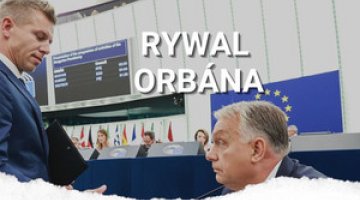Patriots for Europe: Orbán’s attempt to unite the radical right
cooperation: Krzysztof Dębiec
Patriots for Europe (PfE), an alliance of three parties – Hungary’s Fidesz, the Czech Republic’s ANO, and the Freedom Party of Austria (FPÖ) – founded on 30 June, has become the nucleus of a new group in the European Parliament. In the following weeks, almost all the parties that had been part of the Identity and Democracy (ID) group in the previous term joined. Patriots for Europe are set to have 84 out of a total of 720 seats, making them the third-largest group in the European Parliament. Its chairman is Jordan Bardella from France’s National Rally, with Kinga Gál from Fidesz serving as the group’s first vice-chair.
Commentary
- Although the Patriots for Europe started as an alliance of three Central European parties, it has become, in fact, a new incarnation of the far-right Identity and Democracy (ID) group. The main difference is the exclusion of the Alternative for Germany (AfD), which was expelled from ID just before the European Parliament elections, and the addition of the unaffiliated Fidesz, the ANO movement – previously part of the liberal political family – and the Spanish party VOX, which left the European Conservatives and Reformists (ECR). The parties forming Patriots for Europe share opposition to illegal immigration and criticism of the EU. However, they do not advocate for leaving the European Union but rather challenge its institutions and mainstream European politics. This also applies to their approach to the Russian invasion of Ukraine with most of the parties – including Fidesz, led by Hungarian Prime Minister Viktor Orbán – criticising support for Ukraine and advocating for an agreement with the Kremlin.
- Orbán was among the instigators in forming the alliance, with his party having remained unaffiliated in the European Parliament since 2021, following its exit from the European People’s Party (EPP). His earlier attempts to join the European Conservatives and Reformists (ECR) ended in failure. The main reason was opposition from several ECR members to the pro-Russian policies of the Hungarian Prime Minister, with Fidesz claiming it would not like to sit in the same group with the Alliance for the Union of Romanians (AUR), which was admitted after the June elections and is allegedly anti-Hungarian. Orbán also failed to create a broad hard-right front, a union of the ECR and the ID, which he has advocated for several years. Moreover, the AfD, excluded from the Identity and Democracy group just before the European Parliament elections, formed a separate group called Europe of Sovereign Nations. As a result, the right wing of the European political scene is more divided than in the previous term, despite the fact that hard-right parties have gained more seats than in the 2019 elections.
- Orbán is using Patriots for Europe to strengthen his image as a leader of the international radical right, building his influence both at home, in Europe, and in the US, within the Republican Party. However, Patriots for Europe gives him little sway over actual political decisions because the mainstream political groups in the European Parliament isolate this group due to its extreme views; for example, no PfE candidate has been granted key parliamentary posts. Orbán’s position in the European Council is weak, although he hopes that more leaders of the member states will defend him on issues of rule of law and support his, so far, isolated stance on the Russian invasion of Ukraine (see ‘Orbán’s self-proclaimed ‘peace mission’ at the beginning of Hungary’s EU Council presidency’). Some of the parties within PfE are already part of ruling coalitions in their countries (the Freedom Party in the Netherlands and Lega in Italy), and polls forecast a victory for the FPÖ in the September elections in Austria and a return to power for ANO in the Czech Republic in autumn 2025.
- The most unexpected member of Patriots for Europe is the Czech Republic’s ANO. The party led by the former (and likely future) Prime Minister Andrej Babiš used to be part of the liberal Renew Europe group and was a typical example of a catch-all party, adapting its policies to current sentiments and needs. There was a time when it targeted moderate right-inclined voters using an anti-corruption agenda, and then left-wing voters by promising social programmes. However, in recent years, it has focused on courting the anti-establishment electorate. Babiš himself has identified the main goals of PdE as defending national sovereignty, combating illegal migration, and changing the Green Deal (the ban on the sale of new combustion cars after 2035 is particularly controversial in the Czech Republic). It may also be politically advantageous for Babiš to stand alongside Orbán, as the latter is quite popular in the Czech Republic (according to the latest CVVM survey, he is the fourth most-trusted foreign politician, with 27% support, just behind Volodymyr Zelensky). Babiš has already attempted to emulate Orbán’s rhetoric based on the war–peace dichotomy in the 2023 presidential elections. However, this move is not without risk. Currently, the government coalition parties criticise his alliance with pro-Russian groups, which is controversial in a country that strongly supports Ukraine. Additionally, the policies of Marine Le Pen and Geert Wilders, who advocate for restricting access to domestic markets, could negatively impact the export-oriented Czech Republic. Another problem is the anti-Israel statements from FPÖ leader Herbert Kickl, as pro-Israel sentiments predominate among the Czech public and most political parties.





